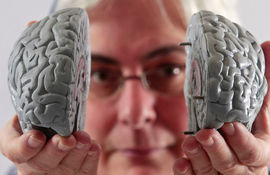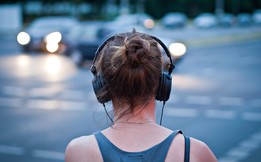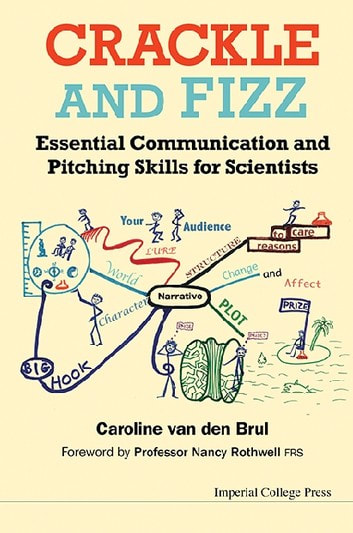Media News Archive
2023
September 2023:
Dana Foundation - Science in Society Career Panel

Dr. Grahn discussed the possible career paths that can come from neuroscience and specifically, neuroscience and music.
2022
March 2022:
We asked sports psychologists to analyze 5 Olympians' favourite pump-up songs

Dr. Grahn and colleagues discuss how music impacts the human brain in incredibly unique ways, giving it an optimal effect on athletic performance.
2021
November 2021:
London Free Press - London Parkinson's researcher tunes into how music makes us move

Dr. Grahn discusses her research with the London Free Press. What is it about certain musical rhythms that make us want to move? What happens in our brains when we hear a song and bob our head or tap our foot?
June 2021:
Feeling the Beat: The neuroscience of movement and dancing with Parkinson’s Disease

Dr. Grahn in conversation with David Leventhal. This hour-long event featured a moderated conversation between Dr. Jessica Grahn, a cognitive neuroscientist and Associate Professor at Western University, in London, Ontario studying beat perception and the brain, and David Leventhal, Program Director of Dance for PD, an organization that offers therapeutic dance classes for people with Parkinson's Disease.
May 2021:
BBC Sounds CrowdScience - Why is learning stuff harder as you get older?

Have you taken classes to learn a new sport or musical instrument or a language? It’s hard work! Why is it that as children we effortlessly absorb new skills and we don’t as adults? That’s what 50-something listener Gary Grief wondered about playing guitar. Do you need to play more frequently as an adult to attain the same level of expertise? Does the 10,000-hours theory still apply? Presenter and budding tabla-player Anand Jagatia embarks on a musical journey to discover what neuroscience can tell us about muscle memory and learning. Do musicians and sportsmen share the same challenges? By understanding what’s happening in the brain, can we learn how to learn better? With tabla-teacher Satvinder Sehmbey, neuroscientist Dr Jessica Grahn, viola-player Dr Molly Gebrian and sports scientist Prof Yannis Pitsiladis.
April 2021:
Music and Mind: Exploring the Benefits of Music

Dr. Grahn presented at the 2021 Parkinson Society Southwestern Ontario Conference.
February 2021:
Rhythms in the Brain: Why we Move to the Beat

Jessica Grahn is a world leader in Cognitive Neuroscience of Music. She investigates why we move to rhythm, and how movement and rhythm are connected in the brain. In addition to using brain scanning to understand how motor areas in the brain respond to different types of rhythm, she also examines how rhythm and music affect those with dysfunction in movement areas, such as Parkinson’s disease and stroke.
2020
April 2020:
Dr. Grahn and colleagues talks with CBC Ideas about the beat and groove

Rhythm is of course a fundamental part of music. But neuroscience is revealing that it’s also a fundamental part of our innermost selves: how we learn to walk, talk, read and even bond with others. From heartbeats heard in the womb, to the underlying rhythmic patterns of thought, rhythm — as one researcher puts it — is life.
Listen to the podcast here
Listen to the podcast here
Dr. Grahn and colleagues discuss how Music-making brings people together during the coronavirus pandemic

People across the globe started making music together from their windows and balconies. As music neuroscientists who study how music affects our bodies and brains, we would like to shed light on the question: why do we turn to collective music-making in times of crisis?
February 2020:
Twenty Thousand Hertz Podcast - Good Vibes Episode #87
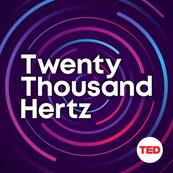
We know that music has the power to affect our moods, but you might be surprised by just how deep the rabbit hole goes. Music can affect our brains and bodies in profound ways. Professor Jessica Grahn tells us how our love for music has shaped us as humans while Nate Sloan unpacks our appreciation of music, and reveals how it can be used to manipulate us, both for bad and for good.
Listen to the Podcast here
2019
April 2019:
Dallas Symphony Soluna Festival
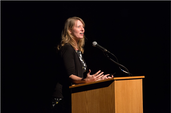
Dr. Grahn participated in the Music and the Brain Symposium at the Dallas Symphony Soluna Festival.
February 2019:
CBC Radio Interview and Article

Dr. Grahn comments on how conscious choice and what music we listen to can affect our mood in a CBC radio interview and article, Starbucks' music is driving employees nuts. A writer says it's a workers' rights issue. The interview aired on February 25, 2019 on the CBC Radio show, The Current.
2018
November 2018:
Dr. Grahn receives the McGill-Western Collaboration Grant

Congratulations to Dr. Jessica Grahn on receiving a McGill-Western Collaboration Grant, managed by BrainsCAN and HBHL. You can find more information on the award along with a project summary here.
April 2018:
The Parkinson's Society of Southwestern Ontario
Dr. Grahn presents at Living Well Conferences in London and Sarnia. """"Mental health challenges affect quality of life for both the person living with Parkinson’s and their CarePartner. Dr. Grahn presented information and strategies for dealing with these challenges.
March 2018:
Cognitive Neuroscience Society Press Release

From Lullabies to Live Concerts: How Music and Rhythm Shape Our Social Brains
Check out some of the LIVElab work by postdoc Molly Henry and Dr. Grahn.
Check out some of the LIVElab work by postdoc Molly Henry and Dr. Grahn.
January 2018:
Daily Beast Article

Music Might Help Neil Diamond Fight His Parkinson's Disease
Dr. Grahn talks about the ongoing research in the lab looking at the benefits of music for individuals with Parkinson's Disease.
Dr. Grahn talks about the ongoing research in the lab looking at the benefits of music for individuals with Parkinson's Disease.
2017
November 2017:
Nature Human Behaviour Publication

Tuning the Brain to Musical Delight
Dr. Grahn illuminates how brain circuitry underlies our love of music by discussing a new study that uses brain stimulation to alter emotional reactions to favourite songs.
Dr. Grahn illuminates how brain circuitry underlies our love of music by discussing a new study that uses brain stimulation to alter emotional reactions to favourite songs.
July 2017:
BBC Mundo Article

What the song "Despacito" by Luis Fonsi and Daddy Yankee does to your brain, according to scientists (and why this explains its success)
Dr. Grahn discusses why songs like Despacito can be so catchy. Google translate will be required to read this article in english.
Dr. Grahn discusses why songs like Despacito can be so catchy. Google translate will be required to read this article in english.
June 2017:
Cadence Podcasts
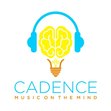
Sometimes Behave So Strangely Redux
In this episode of the Cadence Podcast, Post Doc Christina vanden Bosch der Nederlanden discusses the speech-song illusion with Indre Viskontas.
Feeling the Beat and The Clocks in Your Mind
Dr. Grahn discusses how people perceive the beat in music and how this ability may have been evolutionarily advantageous.
In this episode of the Cadence Podcast, Post Doc Christina vanden Bosch der Nederlanden discusses the speech-song illusion with Indre Viskontas.
Feeling the Beat and The Clocks in Your Mind
Dr. Grahn discusses how people perceive the beat in music and how this ability may have been evolutionarily advantageous.
BBC Radio 3 Interview
Dr. Grahn discusses what types of rhythms we find "irresistible" in an episode of The Listening Service. Aired on June 25, 2017
January 2017:
AirTalk Discussion with Matt Sachs
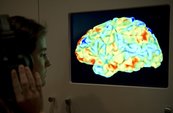
Can music help alleviate stress, anxiety?
In this episode of AirTalk, Dr. Grahn and Matt Sachs (University of Southern California) discuss whether music can help in managing stress and anxiety.
In this episode of AirTalk, Dr. Grahn and Matt Sachs (University of Southern California) discuss whether music can help in managing stress and anxiety.
EMBO Reports - Science & Society Article

Feel the Beat
In this overview article of the various questions associated with music and the brain, Dr.Grahn discusses the role of the motor system and predictive timing in processing music.
In this overview article of the various questions associated with music and the brain, Dr.Grahn discusses the role of the motor system and predictive timing in processing music.
CTV News Interview

From barely walking to dancing - How music transformed a man with Parkinson's
Dr. Grahn responds to viral video of a man with Parkinson's going from barely walking to dancing when his physical therapists plays music while he walks. In this CTV news article Dr. Grahn discusses some of the theories of how music helps patients with movement disorders and why it helps some patients but not all.
Dr. Grahn responds to viral video of a man with Parkinson's going from barely walking to dancing when his physical therapists plays music while he walks. In this CTV news article Dr. Grahn discusses some of the theories of how music helps patients with movement disorders and why it helps some patients but not all.
2016
December 2016:
Interview on The Nature of Things
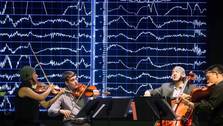
I Got Rhythm: The Science of Song
Dr. Jessica Grahn and Dr. Laurel Trainor use the LIVELab at McMaster to study socialbonds created by music. Dr. Grahn also examines human's natural tendency to synchronize to the beat and clinical applications of this in music therapy with Parkinson's patients.
Dr. Jessica Grahn and Dr. Laurel Trainor use the LIVELab at McMaster to study socialbonds created by music. Dr. Grahn also examines human's natural tendency to synchronize to the beat and clinical applications of this in music therapy with Parkinson's patients.
November 2016:
CTV News Interview

Music as Medicine
Watch Dr. Grahn talk about the benefits of music on memory, emotion, and cognitive functioning in this two part series about the London Intergenerational Choir on CTV News.
Watch Dr. Grahn talk about the benefits of music on memory, emotion, and cognitive functioning in this two part series about the London Intergenerational Choir on CTV News.
Article on Pitchfork
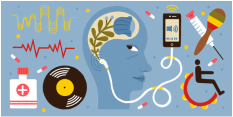
The Doctor Is In (Your Pocket): How Apps Are Harnessing Music’s Healing Powers
A new crop of startups are combining science and sound to help people to self-medicate with music on an unprecedented scale. Dr.Grahn in collaboration with the Sync Project develops ways to collect information on how people respond to music as well as accurately monitor the way people walk using information from Sync's mobile App.
A new crop of startups are combining science and sound to help people to self-medicate with music on an unprecedented scale. Dr.Grahn in collaboration with the Sync Project develops ways to collect information on how people respond to music as well as accurately monitor the way people walk using information from Sync's mobile App.
Article in the Washington Post
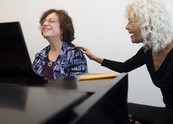
More older adults learn it’s never too late to pick up a musical instrument
Dr. Grahn discusses the benefits of picking up a musical instrument and the differences of learning to play an instrument late in life vs. early in life.
Dr. Grahn discusses the benefits of picking up a musical instrument and the differences of learning to play an instrument late in life vs. early in life.
September 2016:
Interview on the Guardian's Science Weekly Podcast

Express yourself: how music plays with our emotions
Neuroscientists Dr. Jessica Grahn of Western University, London, Ontario, and the Rotman Research Institute’s Dr Valorie Salimpoor discuss how our brains react to music: how intertwined is the experience of listening to music with our emotional reactions?
Neuroscientists Dr. Jessica Grahn of Western University, London, Ontario, and the Rotman Research Institute’s Dr Valorie Salimpoor discuss how our brains react to music: how intertwined is the experience of listening to music with our emotional reactions?
Article in Western Gazette
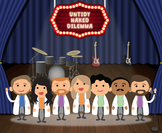
Scientists by day, pop stars by night
Dr. Jessica Grahn and fellow lab members Molly Henry and Dan Cameron are members of the Brain & Mind Institutes official unofficial band - Untidy Naked Dilemma
Dr. Jessica Grahn and fellow lab members Molly Henry and Dan Cameron are members of the Brain & Mind Institutes official unofficial band - Untidy Naked Dilemma
Article in the Western News
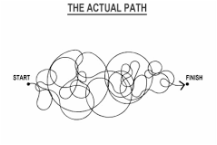
Commentary: Reprogramming ideas about leadership, success
A commentary on Dr. Grahn's lecture 'What do Leaders Look Like? Combating Myths, Bias, and Anxiety on the Path to Success'
August 2016: Interview on the Completely Optional Podcast

Can Music Make You Hungry?
Breakmaster Cylinder, creator of the Completely Optional Knowledge theme music, wonders if music can be used to trigger specific responses in people. Dr. Grahn of the Music and Neuroscience Lab at Western University explores ways that music can influence people and create personal playlists for happier, healthier lives. For host Andrew Norton, a turkey sandwich might be in his future.
Breakmaster Cylinder, creator of the Completely Optional Knowledge theme music, wonders if music can be used to trigger specific responses in people. Dr. Grahn of the Music and Neuroscience Lab at Western University explores ways that music can influence people and create personal playlists for happier, healthier lives. For host Andrew Norton, a turkey sandwich might be in his future.
June 2016: Presentation at BAFTA's BrainCanDo conference
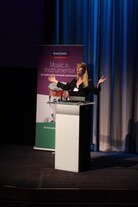
Why does music make us move? Rhythm and the brain
Dr. Grahn investigates why music makes us move. A highlight was a video of Ronan the Sealion, one of the first mammals to show signs of keeping a beat. Dr. Grahn concludes that the brain finds music and moving to music to be mor erewarding with others.
Dr. Grahn investigates why music makes us move. A highlight was a video of Ronan the Sealion, one of the first mammals to show signs of keeping a beat. Dr. Grahn concludes that the brain finds music and moving to music to be mor erewarding with others.
2015
November 2015: Article in The Londoner
|
London's newest (academic) supergroup The Londoner reports about Dr. Grahn and the new Musical Learning Across the Lifespan (MLAL) Group.
| |||||||
September 2015: Article in The Guardian

Why does music give us chills?
Dr. Grahn gave an interview about this question to David Shariatmadari, editor on the Guardian's opinion desk in London (UK).
Dr. Grahn gave an interview about this question to David Shariatmadari, editor on the Guardian's opinion desk in London (UK).
August 2015: Article in The Parkinson's Update
|
Our lab has an article on page 14 of The Parkinson's Update from The Parkinson's Society of Southwestern Ontario discussing Rhythmic Auditory Stimulation Therapy. |
May 2015: Article in The Atlantic Magazine
|
Can music be used as medicine? This article includes quotes from music neuroscientists Dr. Zatorre and Dr. Grahn. |
April 2015: Music, memorization, and the brain
|
How do musicians perform such amazing memory feats on a regular basis? Dr. Grahn explores the brain's role in the classical tradition of musical memorization, in an article for the BBC Proms magazine. |
2014
October 2014:
Dr. Grahn presented two presentations at The Musical Brain's conference, Mozart and the Power of Music: Memory, Myth and Magic. Dr. Grahn's first talk was titled, Mozart and Musical Memory. Dr. Grahn also discussed "The Mozart Effect" and lastly, chaired an open discussion on memorizing music.
2013
November 2013: Crackle and Fizz: Essential Communication and Pitching Skills for Scientists
October 2013: Radio interview with Scott Radley
Dr. Grahn is interviewed on the Scott Radley radio show.
April 2013: "Mozart effect", or can music make you smarter?

Dr. Grahn speaks on the misconceptions behind the Mozart effect in an interview with "The Voice of Russia" and how it is more than just listening to music that causes mental benefits, such as a boost to mood from listening to an enjoyable piece of music or learning to play a musical instrument.
March 2013: Let's Get Physical: The Psychology of Effective Workout Music

In an interview with Scientific American magazine, Dr. Grahn discusses the neuroscience behind music and exercise and how to tailor music to get the most out of your workout.
|
Voice of Russia: "Musical Training and Brain Structure" (Radio Interview)
The Sports Lounge with Scott Radley: "Music and Exercise" (Radio Interview, CHML, Hamilton, ON) PIR's (Partners in Research) National Awards (Interview, London, ON) Canadian Medical Hall of Fame's Discovery Day Voice of Russia: "Mozart effect", or can music make you smarter? (Radio Interview) Scientific American: "Let's Get Physical: The Psychology of Effective Workout Music" TEDxWestern: Music and Intelligence TEDxWaterloo: Music on the Brain Western Alumni Talk (Sarnia, ON) Kiwanis Club of London: Public Lectures (London, ON) "Pleasant and Unpleasant Sounds" (Radio Interview, CJXX) |
2012
May 2012: Early Researcher Award from Ontario Ministry for Economic Development and Innovation
This $150,000 award from the Ontario government will support trainees in the Grahn lab working on the relationship between music and the motor system in the brain, with the ultimate aim of tailoring musical rhythm to benefit patients with movement disorders. Western News.
August 2012: Discover TV: music & the brain
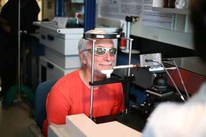
Jay's Body: Inside and Out
In one segment, Dr. Grahn scans Jay Ingram with fMRI to demonstrate how his brain responds to music. Aired on the Discovery Channel on August 28, 2012. Rhythm segment starts at ~4:20.
August 2012: Radio interview
Metamorphosis: CBC Radio episode about Dr. Ciccoria, a man struck by lightning who became obsessed with music. Dr. Grahn comments.
April 2012: Dr. Grahn awarded GRAMMY foundation grant

The music and neuroscience lab has been awarded a GRAMMY Foundation Research Grant to investigate the basis of musical rhythm perception, using the ultra-high field 7-Tesla MRI housed at Western's Robarts Research Institute. These funds will support research to discover the neural underpinnings of our uniquely human capacity for moving to music. This grant is one of only six scientific research grants awarded across all of North America. The project will be conducted in collaboration with ultra-high field MRI experts and Western scientists Stefan Everling and Joe Gati.
March 2012: CFI funds music and neuroscience lab
We are grateful to the Canadian Foundation for Innovation for funding our new lab. You can listen to an interview about music and the brain and our lab's research on the CBC's Ontario Morning radio show.The CFI funding will enable us to purchase cutting-edge equipment in support of research into music and the brain.
The Laboratory for Neuroscience and Musical Rhythm Investigation will support research in several exciting areas, including:
The Laboratory for Neuroscience and Musical Rhythm Investigation will support research in several exciting areas, including:
- How and why does music make us move? In particular, how does music influence different types of movement, and how can we optimize this effect for patients with disorders such as Parkinson's disease?
- Can comparing the brains of humans and monkeys help us to understand why humans have developed a musical culture?
- Why do some people 'feel the beat' easily, and while others have two left feet? How does musical or rhythmic ability relate to movement or language ability?
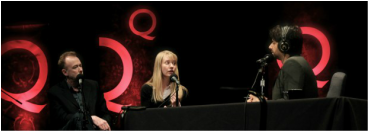
Dara O'Briain's Science Club (TV, BBC Two, Series 1 Episode 6)
BMI Day (Lab Demo & Presentation for the Thames Valley District School Board's Gifted Program)
"Drumming and Cognition" (Radio Interview, CJXX)
Harry Somers Lecture: "Music and the Brain" (Stratford Summer Music Festival)
Metamorphosis with Richard Syrrett (Radio Interview, CBC)
Rotman Institute of Philosophy's Science Pub Night (Public Lecture & Discussion)
"In the groove: the connection between music, movement, and the brain" (Public Lecture, Fall Preview Day, Western University)
"The science of being human: Nature and Nurture" (Public Lecture, London, ON)
"Western gets more research funding" (Newpaper Interview, Western Gazette)
Q with Jian Ghomeshi (Public Radio Interview at the Grand Theatre, London, ON, CBC)
"Links between Music, Movement, and the Brain" (Radio Interviews on CBC, CJXX, CJBK, AM980)
BMI Day (Lab Demo & Presentation for the Thames Valley District School Board's Gifted Program)
"Drumming and Cognition" (Radio Interview, CJXX)
Harry Somers Lecture: "Music and the Brain" (Stratford Summer Music Festival)
Metamorphosis with Richard Syrrett (Radio Interview, CBC)
Rotman Institute of Philosophy's Science Pub Night (Public Lecture & Discussion)
"In the groove: the connection between music, movement, and the brain" (Public Lecture, Fall Preview Day, Western University)
"The science of being human: Nature and Nurture" (Public Lecture, London, ON)
"Western gets more research funding" (Newpaper Interview, Western Gazette)
Q with Jian Ghomeshi (Public Radio Interview at the Grand Theatre, London, ON, CBC)
"Links between Music, Movement, and the Brain" (Radio Interviews on CBC, CJXX, CJBK, AM980)
2011
"The myth of the Mozart effect" (Interview, BBC Radio 4)
"The Neuroscience of Music: How Rhythm Moves Us" (Public Lecture, Eton College, UK)
"Enigmas of Music and the Brain" (TV Interview, C5N, Argentina)
"My Musical Brain" at the Newcastle Science Festival (Sage Gateshead)
"The Neuroscience of Music: How Rhythm Moves Us" (Public Lecture, Eton College, UK)
"Enigmas of Music and the Brain" (TV Interview, C5N, Argentina)
"My Musical Brain" at the Newcastle Science Festival (Sage Gateshead)
2010
"Current Findings in Music Neuroscience" (Lecture, The Musical Brain: Arts, Science, & the Mind) (Read a news highlight in Nature)
"Music and your Brain" (Lecture, The Manchester Science Festival)
"Hit me with your rhythm schtick: The connection between music, movement, and the brain" (Charles Darwin Award Lecture, British Science Festival)
"Rhythms in your Brain" (Interactive Lecture, Lovebox Music Festival and the Secret Garden Party Festival)
"The Power of Music" (Interactive Exhibit, Royal Society 350th Anniversary Summer Science Exhibition)
Music and the Brain (Interview in Argentine newspaper, Perfil)
"Improvisation, Creativity, and Music" A dialogue between neuroscience and music with Gilad Atzmon (Institute of Neuroesthetics, London, England)
Your Amazing Brain Exhibit Neuroscience contributor (At-Bristol Science Centre)
"Why do we move to musical rhythm?" (Interactive Experiment, Science Week, Cambridge)
"Music and your Brain" (Lecture, The Manchester Science Festival)
"Hit me with your rhythm schtick: The connection between music, movement, and the brain" (Charles Darwin Award Lecture, British Science Festival)
"Rhythms in your Brain" (Interactive Lecture, Lovebox Music Festival and the Secret Garden Party Festival)
"The Power of Music" (Interactive Exhibit, Royal Society 350th Anniversary Summer Science Exhibition)
Music and the Brain (Interview in Argentine newspaper, Perfil)
"Improvisation, Creativity, and Music" A dialogue between neuroscience and music with Gilad Atzmon (Institute of Neuroesthetics, London, England)
Your Amazing Brain Exhibit Neuroscience contributor (At-Bristol Science Centre)
"Why do we move to musical rhythm?" (Interactive Experiment, Science Week, Cambridge)
2009
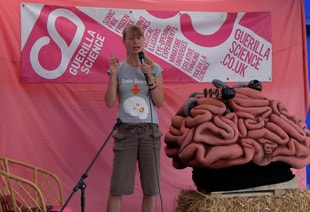
"Music and neuroscience: Does music make us brighter?" (Lecture, The Cambridge Music Festival)
"The Musical Brain" (Interview, Woman's Hour, BBC Radio 4)
"Great music and why we love it" (Public lecture and open rehearsal discussion, Wellcome Trust Event: The Nash Ensemble and the Musical Brain - Post-festival report)
"Music and your Brain" (Lecture, Guerrilla Science, Latitude Festival and The Secret Garden Party)
"Does music make you smarter?" (Lecture, Science Week, Cambridge)
"The Musical Brain" (Interview, Woman's Hour, BBC Radio 4)
"Great music and why we love it" (Public lecture and open rehearsal discussion, Wellcome Trust Event: The Nash Ensemble and the Musical Brain - Post-festival report)
"Music and your Brain" (Lecture, Guerrilla Science, Latitude Festival and The Secret Garden Party)
"Does music make you smarter?" (Lecture, Science Week, Cambridge)
2003-2008
Move to the Music (Interview, Article in APA Monitor, 2008)
"In the groove: Rhythm processing in the brain" (Lecture, Science Week, Cambridge, 2006)
"Testing memory for regular and irregular rhythms" (Interactive Experiment, Science Week, Cambridge, 2004)
SET for Britain (Poster Presentation, House of Commons, 2004)
"Musical Rhythms: How we feel beat?" (Interactive Experiment, Science Week, Cambridge, 2003)
"In the groove: Rhythm processing in the brain" (Lecture, Science Week, Cambridge, 2006)
"Testing memory for regular and irregular rhythms" (Interactive Experiment, Science Week, Cambridge, 2004)
SET for Britain (Poster Presentation, House of Commons, 2004)
"Musical Rhythms: How we feel beat?" (Interactive Experiment, Science Week, Cambridge, 2003)
